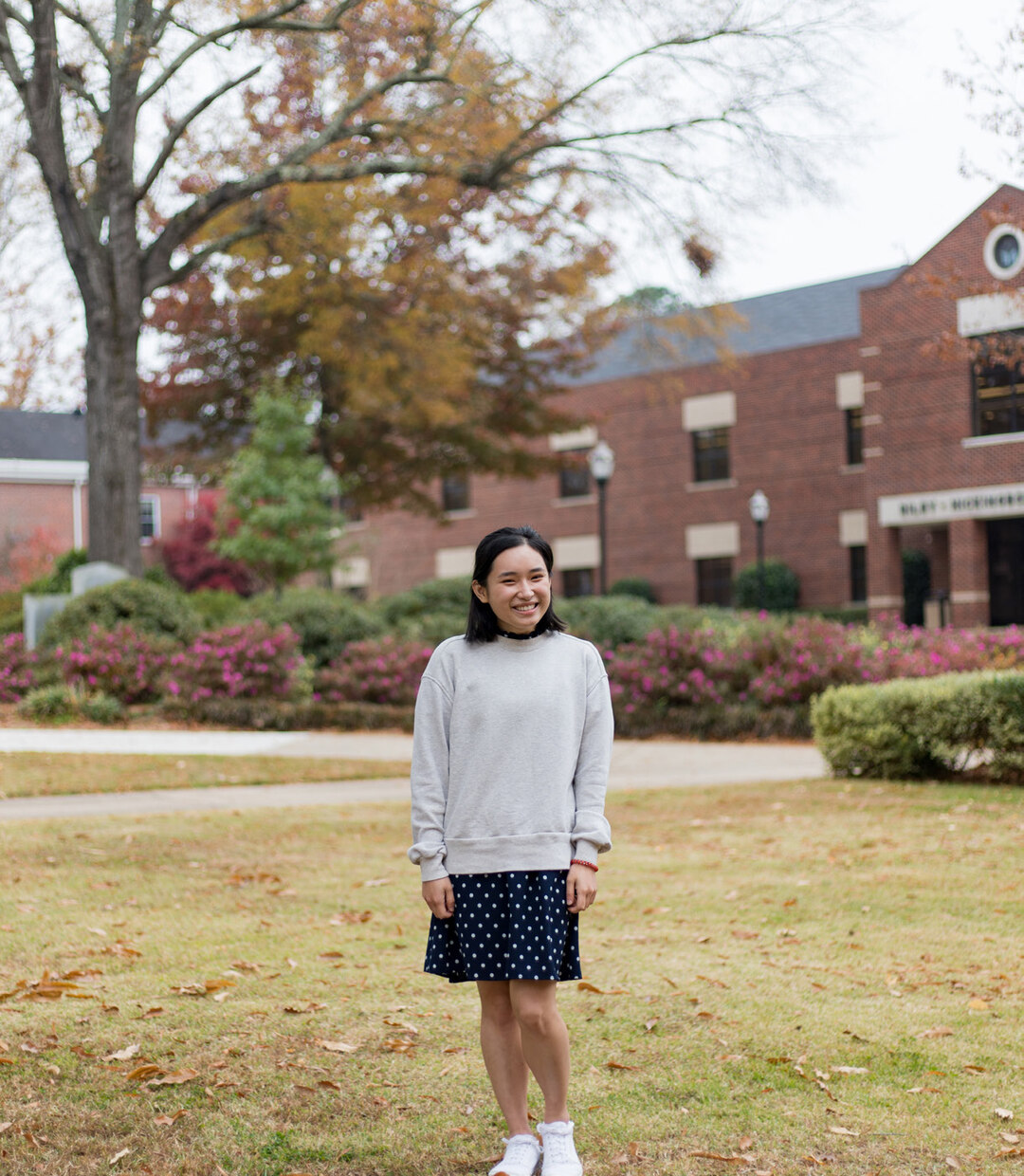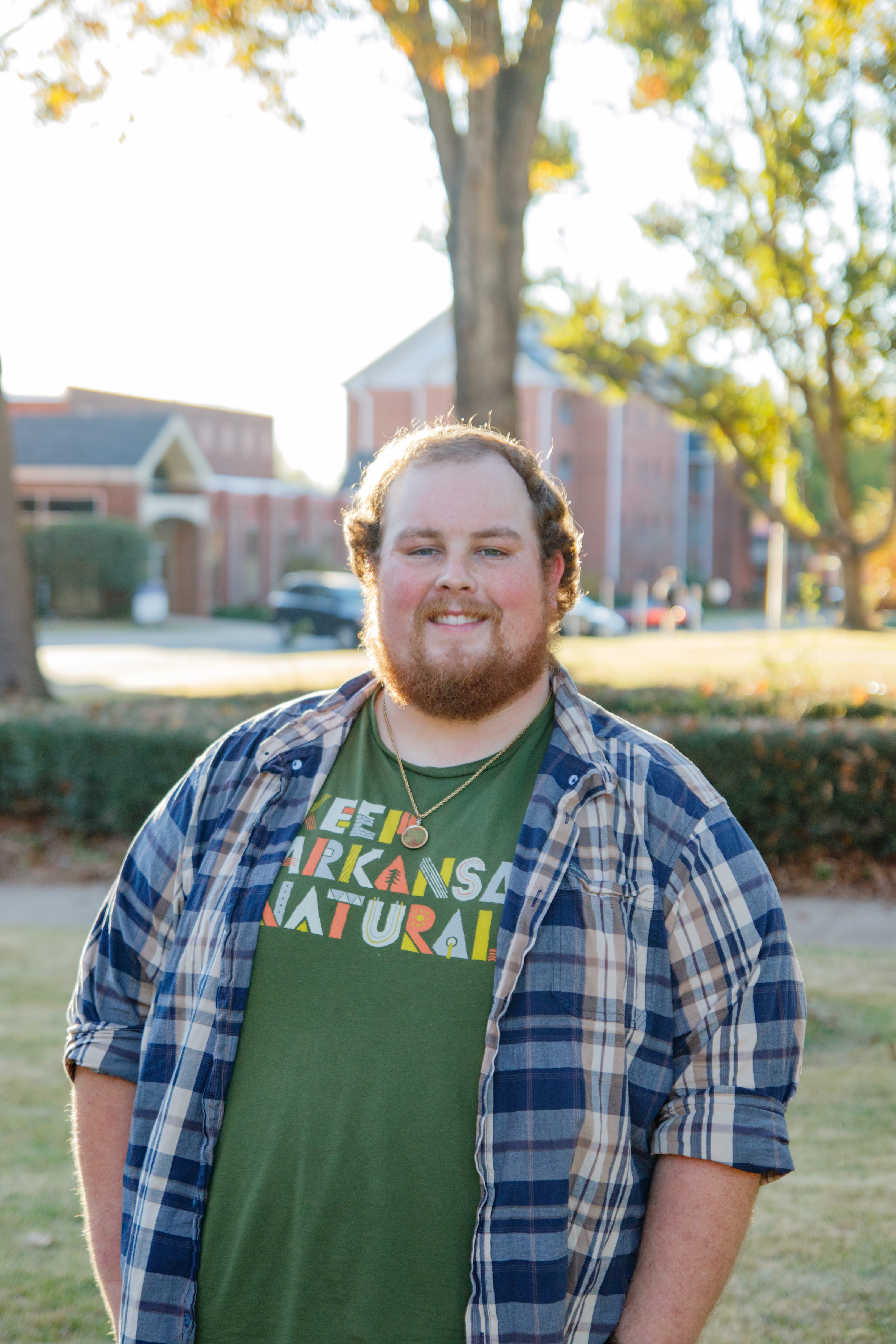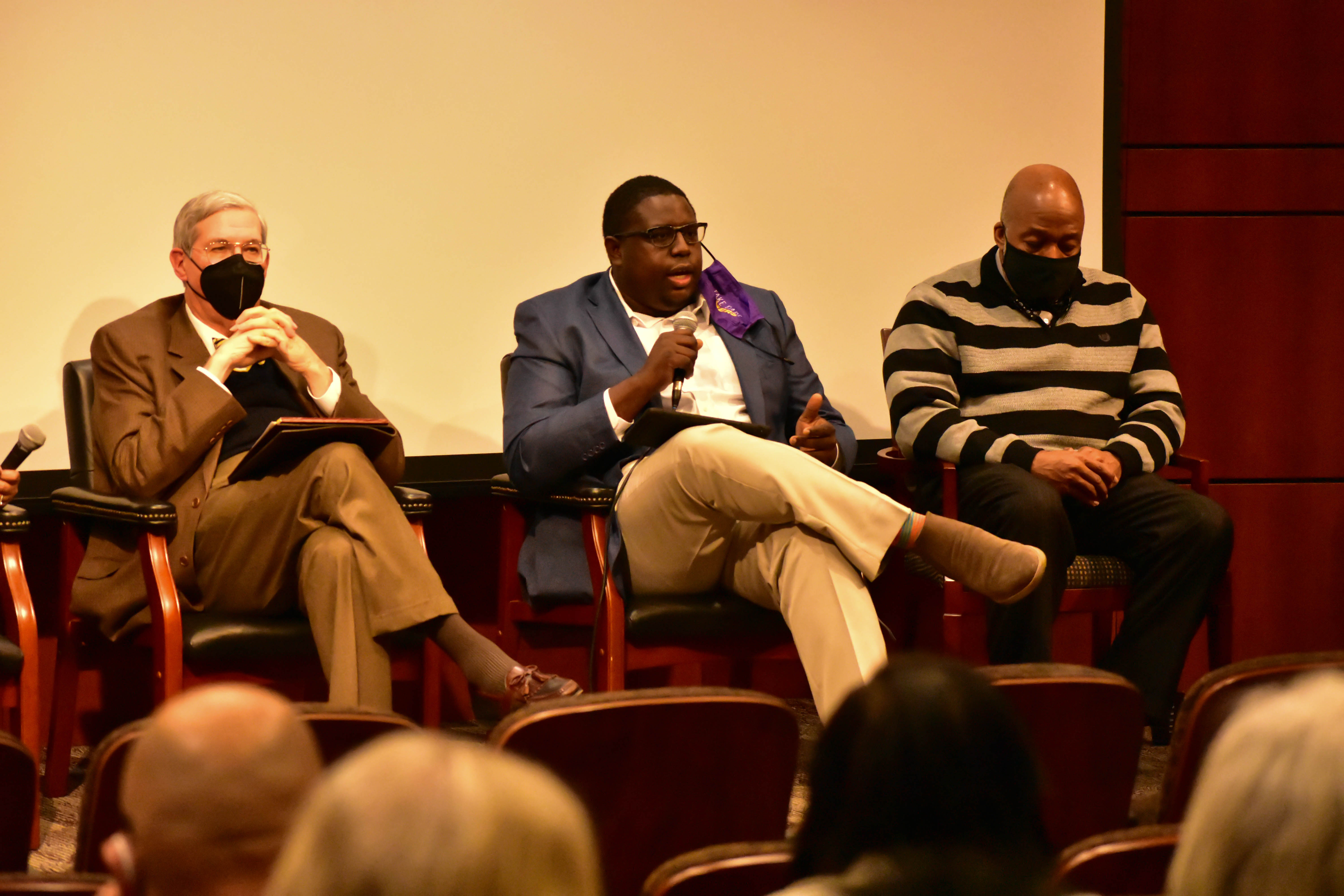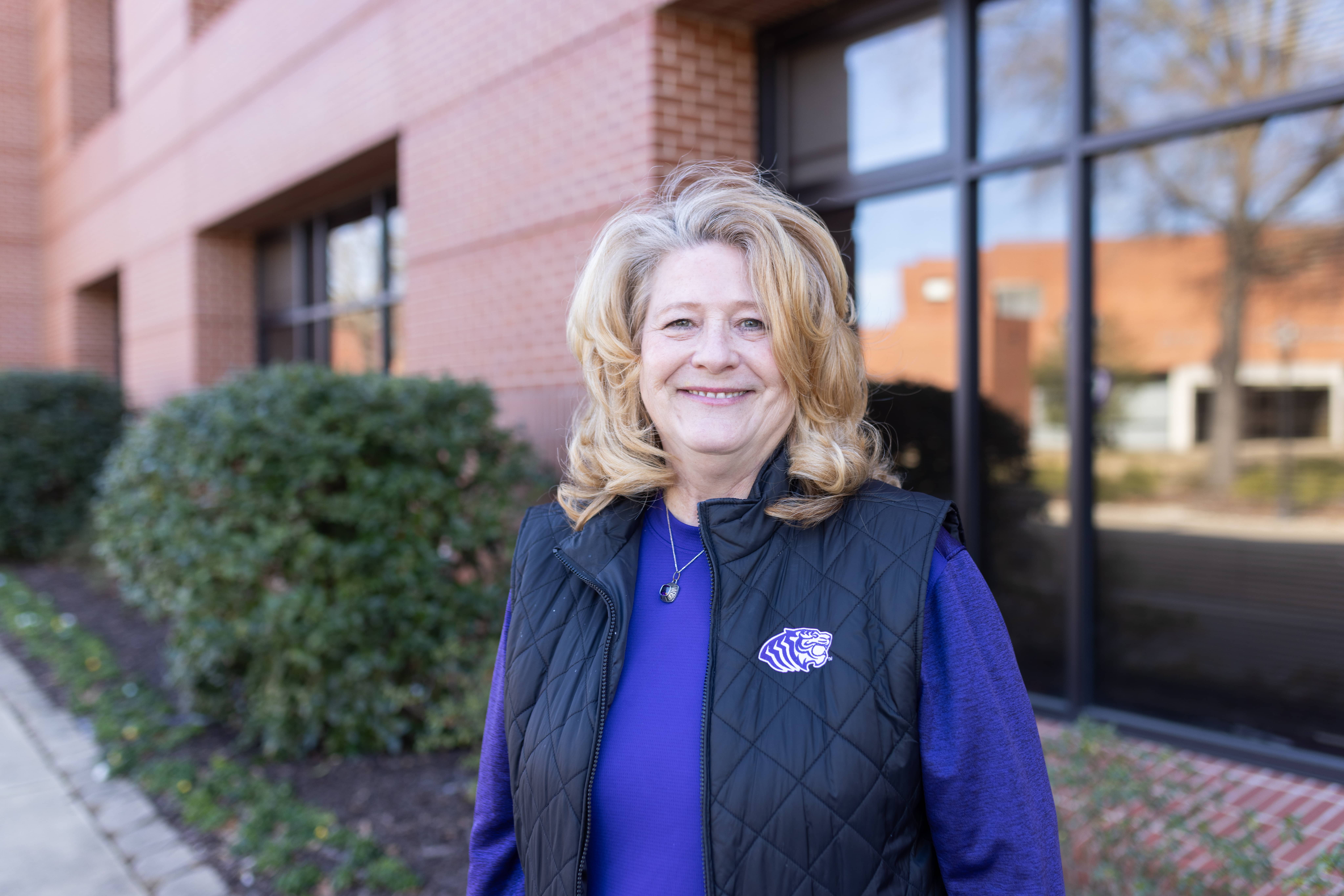By Langley Leverett, Copy Editor
from Volume 130: Issue 6: December 9, 2021
She has storyteller eyes. Dark brown and inky– they are like the dense script in her journals, or the decorated post-it notes spread across her room. While her eyes observe, they absorb every detail, searching for the glimmer of a story. Her eyes scan, looking for something resembling the truth, or at least, something with a little magic.
Cora Saddler, a senior English and Spanish major from Cabot, Ark., is a writer. She is also Alpha Chi president, Sigma Tau Delta copresident, Carl Goodson Honors Program secretary, Women of Tri Chi member and a clarinet player in the wind ensemble. She can be seen running to and from classes or functions, backpack in hand, armed with her yellow water bottle and a printed journal.
What many people don’t know is that Saddler’s birth name is Xing Hong, which translates in English as “Little Red.” When she was an infant, her adoptive parents brought her to Arkansas from the Hunan Province of China.
“My mom is part Cherokee. Her Cherokee name is ‘Big Red.’ Before she went to China to adopt me, she wore this red string, which symbolized good luck. It’s the red string of destiny,” Saddler said. “She was so excited when she found out my name was Xing Hong – she told me, ‘God wanted me to have you.’”
Saddler is a language lover at heart, and she claims that it’s because her mother began to share stories with her at an early age. To help Saddler understand their situation, her mother would make books, often with Saddler being the main character. One of her favorite books was titled “Cora and the Elephants.”
“This herd of elephants adopts a girl named Cora, and she plays with all the other little elephant children. She asks why she is not an elephant, but her parents tell her that they still love her. They live in the jungle and then move to the city. But, they start to miss their home in the jungle, so they bring in elements from their home into the city,” Saddler said. “Things like that helped me understand. I never didn’t understand that I was adopted, but at a certain point I just knew.”
Writing a thesis is a requirement for honors students. Saddler’s thesis consists of multiple short stories revolving around themes of magical realism and surrealism. Part of her inspiration for these stories comes from her own experience of being an Asian American in a predominantly white environment.
“There are times where it was hard not seeing anyone like me in school. I wrote a short story about it, and it might go in my thesis. It’s about the closest I can come to writing about myself,” Saddler said. “It’s about two girls in the past and the present. It’s about the Asian experience I’ve had, where there’s this longing for the girl I would’ve been if I had stayed in China. Who is that girl, what would she have looked like? It’s called ‘Hot and Sour Soup’ because that’s what I feel like– like fake Chinese food. You know, Chinese on the outside, American on the inside.”
Saddler was awarded the Ben Elrod travel grant for her honors thesis. This grant gave her the resources needed to travel to a place of her choosing to find further inspiration for her thesis.
Originally, Saddler planned to visit Japan in the spirit of one of her favorite authors: Haruki Marakami. However, because of COVID restrictions she changed plans and visited New York City. She recounts the overwhelming feeling of belonging, despite the reality that she was alone.
“When I went to New York, we went to Chinatown. I had never, ever, seen so many Chinese people. They were speaking Mandarin, and I felt a sense of comfort, even if I didn’t know what they were saying,” Saddler said. “I could imagine, almost, what it would have felt like if I had grown up there. It felt like going home, in a sense. Maybe ethnicity is a scale. I am proud of the girl I am, and who I am. But there’s always a ‘what if’ question. It will always be a locked door that I’ll never be able to open.”
The experience of traveling to New York and exploring a new environment impressed upon her new ideas and inspiration for not only her stories, but for her own growth.
“It’s a storyteller’s dream to be in New York. Being a woman and being there semi-alone, without my family, forced me to realize what I could do,” Saddler said. “I think some people are afraid to feel small because that might insinuate that their purpose is diminished or not as grand. But I love that feeling of being small because I put a lot of pressure on myself. Being that small takes the pressure away, and makes me realize that there is so much more to life than sitting down and getting my homework done, or getting that ‘A,’ or getting a win. It puts life into perspective.”
After four years of majoring in English and Spanish and being introduced to some of her favorite writers like Gabriel García Márquez, Pablo Neruda and Franz Kafka, Saddler has no regrets over choosing to study language.
“I always knew I was going to major in English since high school. I’ve always loved English, it has always been a subject I gravitated toward, not because it was the easiest subject, but because it was the subject that let me grow the most. It was innate,” Saddler said.
She credits Márquez with her magical realism fascination. This niche genre of literature, closely associated with Latin America, incorporates fantastical elements into realistic fiction.
“There’s something about Márquez that made these mundane things so magical, and the magical so mundane. Something about that really attracted me to it, because I see that in our world, and how everyday there’s these really magical things that happen, but because they happen every day, they lose their luster. I resonated with that.”
Her peers joke that Saddler is superhuman, but it rings true. She is diligent when it concerns writing and academics, not because of a prize or an accolade, but because language affords her the most growth.
“It’s important to me to do my very best. It’s not about the accolades or about the reputation of doing good work. It’s about doing good work. That has always been my motivation. I’ll work on an essay for seven hours, not because I want to win something, but because I want it to be a good essay. I’m learning as I write it. That’s the only way I grow.”
After graduation, Saddler hopes to attend an M.F.A. program, where she can practice creative writing and explore more of her craft.
cover photo by Abby Blankenship







